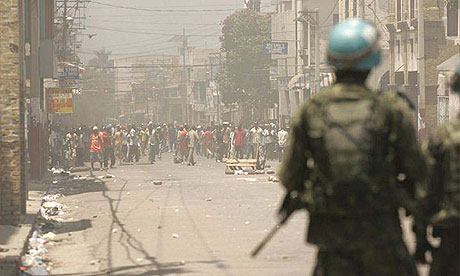Food riots grip Haiti
- guardian.co.uk,
- Wednesday April 9 2008

Haitian rioters block a street in downtown Port au Prince while Brazilian UN peacekeepers look on. Photograph: Kena Betancur/EPA
United Nations peacekeepers fired rubber bullets and used tear gas to control mobs rioting over rising food prices in Haiti yesterday.
Angry protesters tried to break into the presidential palace in the capital, Port au Prince, and demanded that President Rene Preval step down.
Preval was inside the palace at the time, aides said. The president has made no public statements since riots broke out on the island last week. Five people have died in a week of protests, Reuters reported.
Yesterday, protesters smashed windows and looted shops. The city's streets were blocked by burnt-out cars and concrete barricades, while violence forced the US embassy to suspend visa services and routine operations.
Food prices have risen 40% on average since the middle of last year, causing unrest around the world, with riots seen in countries such as Burkina Faso, Cameroon and Egypt.
For months, Haitians have compared their hunger pains to "eating Clorox [bleach]" because of the burning feeling in their stomachs.
Fears exist that the rioting could destabilise the fragile island state. Peacekeepers came to the country in 2004, following the overthrow of former president Jean-Bertrand Aristide.
"I compare this situation to having a bucket full of gasoline and having some people around with a box of matches," said Preval adviser Patrick Elie.
"As long as the two have a possibility to meet, you're going to have trouble."
What progress has been made in stabilising Haiti "is extremely fragile, highly reversible, and made even more fragile by the current socio-economic environment," UN envoy Hedi Annabi said yesterday, after briefing the security council.
The World Food Programme (WFP) made an emergency appeal for donations for Haiti. It said on Monday it has received only 13% of the $96m (£48m) necessary for its Haitian programme.
"Riots in Haiti underline the additional need for lifesaving food assistance," said WFP executive director Josette Sheeran.
"At this critical time, we need to stand with the people of Haiti and other countries hardest hit by rising food prices."
World food prices are not likely to fall in the near term, Jacques Diouf, director general of the Food and Agriculture Organisation, said today.
"There is a risk that this unrest will spread in countries where 50% - 60% of income goes to food."